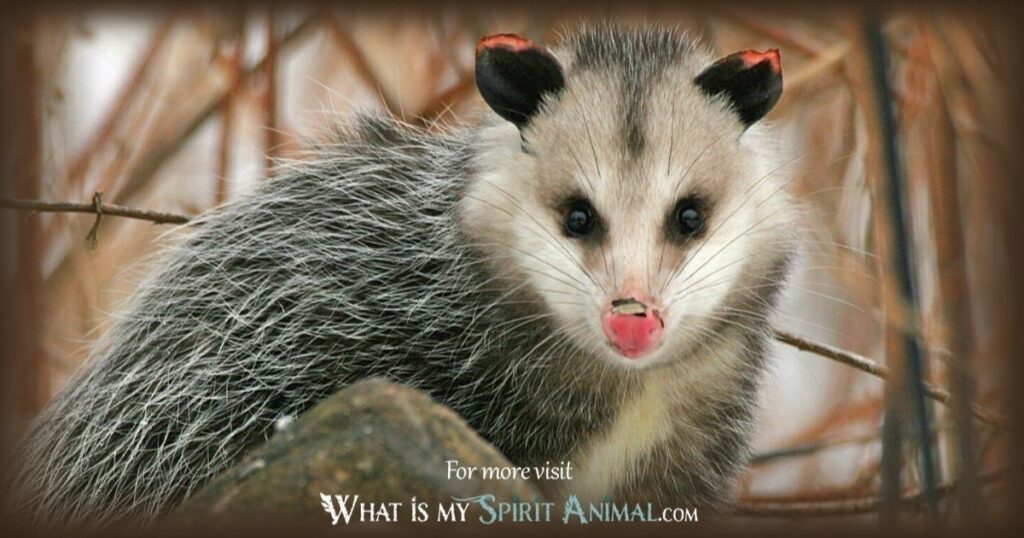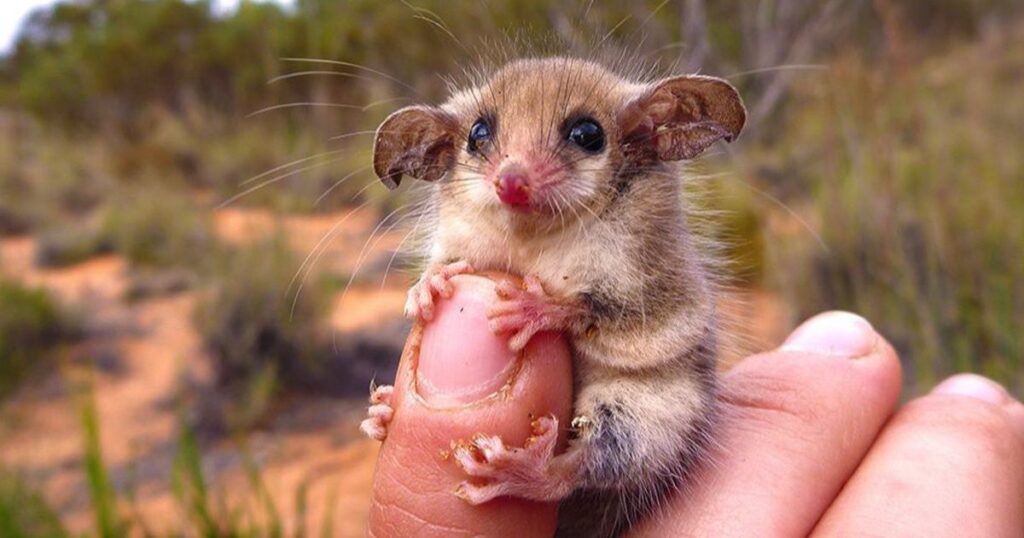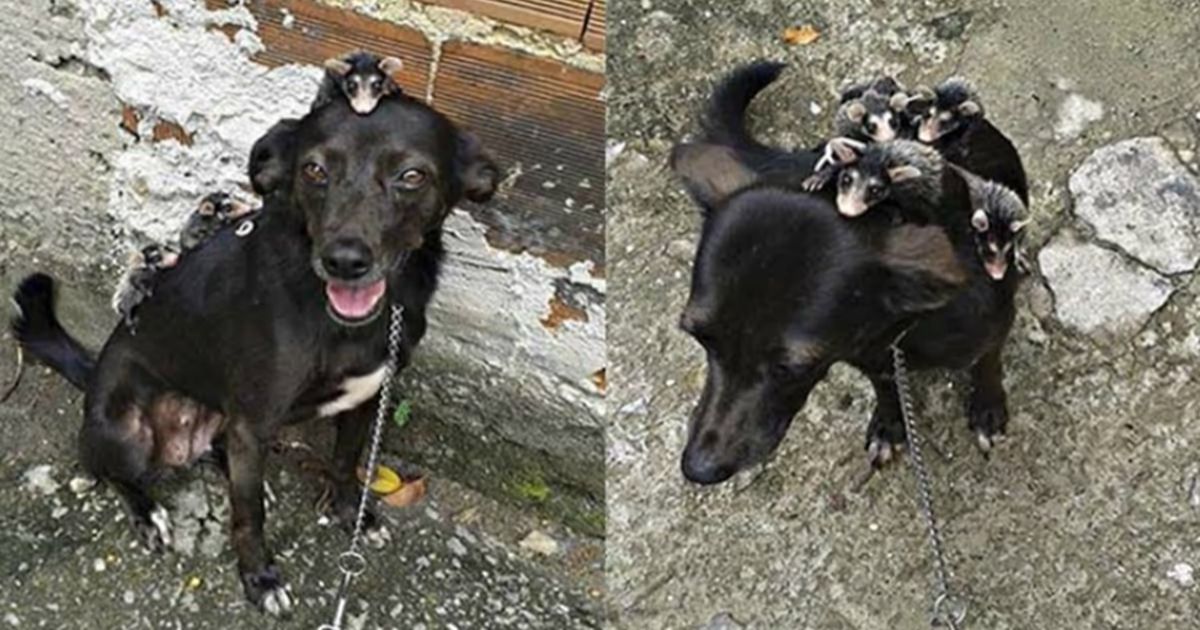As a dog owner, you may have encountered a peculiar creature during your evening walks or in your backyard the possum. These nocturnal marsupials often spark curiosity and concern among pet owners, particularly when it comes to the safety of their furry friends. In this comprehensive guide, we’ll explore the relationship between possums and dogs, addressing the common question: Are possums dangerous to dogs?
What is a Possum?
To understand the potential risks possums may pose to our canine companions, it’s essential first to familiarize ourselves with these unique creatures. The Virginia opossum, commonly known as the North American opossum or simply “possum,” is a fascinating mammal with several distinctive characteristics.
Possums are the only marsupials native to North America, setting them apart from other wildlife you might encounter. These cat-sized mammals typically sport grayish-white fur, giving them a somewhat disheveled appearance. Their most notable feature is the pouch used to carry and nurture their young, a characteristic shared with their distant Australian cousins, such as kangaroos and koalas.
Physical attributes of possums include:
- A long, hairless tail
- A pointed pink snout
- A white face
- Sharp claws
- Small, hairless ears
Possums are highly adaptable creatures, often found in urban and suburban areas. They’re opportunistic omnivores, feeding on a variety of food sources including:
- Insects
- Small snakes
- Baby rats and mice
- Roadkill
- Ticks
- Garden produce
- Pet food left outdoors
- Trash from unsecured garbage cans
Their diverse diet and ability to thrive in human-populated areas make possums a common sight in many neighborhoods across North America.
What Happens When A Possum Encounters a Dog?
When it comes to interactions between possums and dogs, the situation is often less dramatic than many pet owners might fear. Contrary to popular belief, possums are generally docile creatures that prefer to avoid confrontation whenever possible. Their primary defense mechanisms are more passive than aggressive, which can work in favor of both the possum and your dog.
Possum’s Natural Behaviors

- Flight Response: Possums are typically afraid of dogs due to their size difference. In most cases, a possum’s first instinct upon encountering a dog is to run away and seek safety.
- Playing Dead: Perhaps the most famous possum behavior is their ability to “play dead” when threatened. This involuntary response, known as thanatosis, can last anywhere from 40 minutes to several hours. During this time, the possum’s body goes into a comatose-like state, making it appear deceased to potential predators.
- Defensive Display: If a possum feels cornered or threatened, it may resort to a defensive display. This involves showing its teeth, hissing, and drooling – behaviors designed to intimidate and discourage potential attackers.
Dog-Possum Interactions
While possums generally try to avoid confrontation, the outcome of an encounter largely depends on the dog’s behavior and training. Here are some possible scenarios:
- Peaceful Coexistence: In many cases, if a dog is well-trained or naturally calm, it may simply observe the possum from a distance without engaging.
- Chase Instinct: Some dogs, particularly those with strong prey drives, may attempt to chase the possum. This can potentially lead to stress for both animals and should be discouraged.
- Rare Confrontations: In unusual circumstances where a possum feels extremely threatened and unable to escape, it may scratch or bite in self-defense. However, such instances are relatively rare.
It’s important to note that while possums are not inherently dangerous to dogs, any wildlife encounter carries potential risks. As a responsible pet owner, it’s crucial to train your dog to leave wildlife alone and to keep them under control during walks or outdoor time.
Do Opossums Carry Diseases?
One of the primary concerns pet owners have regarding possums is the potential transmission of diseases. While it’s true that, like most wild animals, possums can carry various pathogens, they’re often less of a health threat than commonly believed.
Rabies Resistance
Interestingly, possums have a natural resistance to rabies. Their low body temperature (around 94-97°F) creates an inhospitable environment for the rabies virus to thrive. While a possum can contract rabies, it’s extremely rare.
Other Potential Diseases
Despite their rabies resistance, possums can potentially carry other diseases that could affect dogs if transmitted through a bite or close contact. These include:
- Tuberculosis
- Leptospirosis
- Tularemia
- Spotted fever
- Chagas disease
- Coccidiosis
It’s important to note that while possums can carry these diseases, transmission to dogs is not common. However, if your dog has been bitten by a possum or has come into contact with a dead possum, it’s always best to consult with your veterinarian as a precautionary measure.
Also read this post:Fleas Look Like to a Human Eye?
What If You See Possums In Your Backyard?
Discovering possums in your backyard might initially cause concern, but there’s usually no need to panic. These creatures are often just passing through on their way to their den. Unlike some other wildlife, possums don’t typically cause significant damage to yards or gardens.
Benefits of Possums
Surprisingly, possums can actually provide some benefits to your backyard ecosystem:
- Natural Pest Control: Possums consume a variety of pests, including insects, small snakes, and rodents like baby rats and mice.
- Tick Eaters: Possums are excellent at grooming themselves and can consume thousands of ticks in a single season, potentially reducing the tick population in your area.
- Scavengers: By eating roadkill and other decaying matter, possums help keep the environment clean.
Potential Drawbacks
While possums are generally harmless, there are a few minor inconveniences they might cause:
- Trash Raiding: Possums may rummage through unsecured trash cans in search of food.
- Pet Food Consumption: If you leave pet food outdoors, possums might be attracted to it.
- Garden Sampling: While not typically destructive, possums might nibble on some garden produce.
Overall, the presence of possums in your backyard is often more beneficial than problematic. However, if you’re concerned about their presence or notice an increase in their activity, there are steps you can take to discourage them from frequenting your property.
How to Prevent Possums?

While possums can be beneficial to your yard’s ecosystem, some homeowners prefer to limit their presence. Here are several humane and effective methods to discourage possums from making your property their regular hangout:
- Secure Trash Cans: Use tight-fitting lids or bungee cords to keep trash cans closed. Consider storing them in a garage or shed if possible.
- Remove Pet Food: Avoid leaving pet food outside, especially overnight. If you must feed pets outdoors, bring the food in as soon as they’re finished eating.
- Eliminate Water Sources: Remove standing water from your property, such as in bird baths or low spots in your yard.
- Trim Trees and Shrubs: Keep branches trimmed away from your roof and walls to limit access points for possums.
- Use Motion-Activated Lights: Possums are nocturnal and may be deterred by sudden bright lights.
- Apply Natural Repellents: Some scents, like ammonia or garlic, may discourage possums. However, use these cautiously to avoid harm to other wildlife or pets.
- Seal Entry Points: Check your home’s exterior for potential entry points and seal them to prevent possums from entering your attic or crawl spaces.
- Clean Up Fallen Fruit: If you have fruit trees, promptly remove fallen fruit to avoid attracting possums and other wildlife.
- Use Fencing: If possums are a persistent problem in your garden, consider installing a low electric fence or hardware cloth buried several inches into the ground.
Remember, the goal is to make your property less attractive to possums, not to harm them. These creatures play an important role in the ecosystem, and humane deterrence methods are always the best approach.
Recommended Maintenance
While managing possum activity is important, it’s just one aspect of overall property maintenance and pest control. Here are some additional areas to focus on to keep your home and yard wildlife-friendly yet pest-free:
Raccoon Management
Like possums, raccoons are common urban wildlife that can sometimes cause issues for homeowners. Contrary to popular belief, seeing raccoons during the day doesn’t necessarily mean they’re sick. They may be searching for additional food and water sources. To discourage raccoons:
- Secure trash cans with locking lids
- Remove outdoor pet food
- Clean up fallen fruit and birdseed
- Seal potential entry points to your home
Rodent Control
Rats and mice can be more problematic than possums in terms of home invasion and damage. To prevent rodent infestations:
- Seal small holes and cracks in your home’s exterior
- Store food in airtight containers
- Keep your home clean and free of crumbs
- Remove potential nesting sites like piles of leaves or wood
If you discover a dead mouse in your home, promptly remove it using gloves and disinfect the area. To eliminate odors, you can use:
- Bleach solution
- Vinegar
- Baking soda
- Activated charcoal
- Commercial disinfectants
Bed Bug Prevention
While not directly related to wildlife, bed bugs can be a persistent pest problem. To monitor for bed bugs:
- Regularly inspect bedding and furniture
- Use bed bug-proof mattress and pillow covers
- Be cautious when bringing second-hand furniture into your home
- Consider using bed bug glue traps for early detection
If you suspect a bed bug infestation, it’s crucial to contact a professional pest control service promptly.
By maintaining a comprehensive approach to pest control and property maintenance, you can create an environment that’s less attractive to possums and other unwanted wildlife while still being safe and comfortable for your pets.
When to Contact A Professional?

While possums are generally harmless and can even be beneficial, there may be situations where professional intervention is necessary. Here are some scenarios where you might consider contacting a wildlife control expert:
- Persistent Intrusions: If possums are repeatedly entering your home or causing damage to your property despite your prevention efforts.
- Large Populations: An unusually high number of possums frequenting your property could indicate an underlying issue attracting them.
- Nesting in Structures: If you suspect possums are nesting in your attic, crawl space, or other parts of your home.
- Health Concerns: If you’re worried about disease transmission, especially if you have pets or small children.
- Legal Restrictions: Some areas have regulations about trapping or relocating wildlife. A professional will be aware of local laws.
- Complex Removal Needs: If a possum is stuck in a difficult-to-reach area or seems injured, a professional can safely handle the situation.
- Comprehensive Pest Management: If you’re dealing with multiple wildlife issues and need a holistic approach to pest control.
When choosing a wildlife control service, look for companies that:
- Are licensed and insured
- Use humane removal methods
- Offer long-term prevention strategies
- Have positive reviews and references
Remember, the goal should be to resolve conflicts between humans and wildlife in a way that’s safe for both parties. A reputable wildlife control professional will prioritize humane treatment and prevention over harmful or short-term solutions.
Conclusion
In answering the question “Are possums dangerous to dogs?“, we’ve explored various aspects of possum behavior, their interactions with dogs, and their role in our urban and suburban ecosystems. The conclusion we can draw is that possums, in most cases, do not pose a significant danger to dogs.
Key takeaways include:
- Docile Nature: Possums are generally non-aggressive and prefer to avoid confrontation with dogs and humans.
- Disease Transmission: While possums can carry diseases, they have a low incidence of rabies and are not major disease vectors for dogs.
- Ecological Benefits: Possums provide natural pest control by consuming insects, rodents, and ticks.
- Preventive Measures: Simple steps like securing trash and removing outdoor pet food can discourage possum activity without harm.
- Professional Help: Wildlife control experts can assist with persistent possum issues using humane methods.
As responsible pet owners and members of our local ecosystems, it’s important to approach wildlife encounters with knowledge and respect. By understanding possum behavior and implementing appropriate preventive measures, we can coexist peacefully with these unique marsupials while keeping our furry friends safe.
Remember, if you have specific concerns about possums or other wildlife on your property, don’t hesitate to consult with local wildlife authorities or a reputable pest control service. They can provide tailored advice for your situation and ensure that both your pets and local wildlife remain safe and healthy.
By fostering a balanced approach to urban wildlife management, we can create environments where our dogs, possums, and other creatures can thrive together in harmony.
FAQs
Will possums hurt dogs?
Possums are generally not aggressive towards dogs and typically prefer to avoid confrontation. However, if cornered or threatened, a possum may scratch or bite a dog in self-defense, though such incidents are rare.
Can my dog get a disease from a possum?
While possums can carry various diseases, transmission to dogs is not common. The risk of disease transmission is low, but it’s still advisable to prevent direct contact between your dog and possums.
What happens if my dog gets bit by a possum?
If your dog is bitten by a possum, clean the wound thoroughly and monitor it for signs of infection. It’s best to consult with a veterinarian as soon as possible to assess the need for antibiotics or other treatments.
Do dogs scare away possums?
In most cases, possums are afraid of dogs and will try to avoid them. The presence of dogs in a yard can often deter possums from frequenting the area, though determined possums may still visit if there are attractive food sources available.











